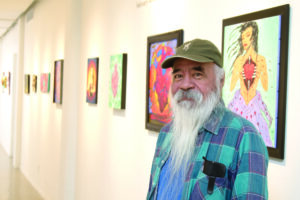By Blanca Reyes
“Everybody has a heart. Everybody relates to hearts,” said Jose Vargas, curator at the Bath House Culture Center’s El Corazon exhibition.
At 73, and with vast experience as an artist, Vargas is presenting one more year of his El Corazon exhibit. Although this is the 28th anniversary of the show, it has a different meaning this year.

Photo by Blanca Reyes
Vargas suffered a heart attack in July, which he said was not severe but gave him a different perspective on life and helped him to create his piece of art that is presented in this year’s El Corazon exhibition.
“I felt like, for one reason or another, God gave me more time. So, what are [you] gonna do with this time,” Vargas said.
Part of the agreement of being the organizer of the show is to create a piece of art as well. So, he decided to go to his garage and start working on his piece because it was therapeutic. Vargas decided to come up with a piece of art representing the feelings that he experienced during the heart attack.
“I found this piece of wood and I said that’s the one that I’m going to work with because it’s right there. I don’t have to go to the store and get it.”
Vargas has been curating the show since 1993, with his Mexican heritage influencing him every step of the way. The exhibition is inspired by Card 27 from the Loteria, Mexican bingo. Although Vargas has never played the game, he enjoys and gets inspired by the festive images of the cards.
Since Vargas was a child, he knew that his art had a special effect on people. He did not understand at that time what made his art so special, but he noticed praise from others at an early age.
Vargas’s third-grade teacher made a great impact on him because she used to take him to the park with his crayons and pad of paper where people could see him drawing.
“In my third grade, Ms. Wittaker would invite me to go and spend the weekend with her,” Vargas said. “Now mind you, it was a little out of the ordinary because, you know, we are Mexican American, Chicanos and she was white.”
Vargas was also largely influenced by his grandmothers. He remembers going to his maternal grandmother in Bardwell, a small town south of Dallas. Vargas said it was a small, Italian community of about 200 people and they did not even have traffic lights on the streets, only stop signs.
Vargas remembers his mother saying: “Don’t touch anything. Don’t ask anything. Don’t say anything. Don’t break anything. And if somebody says something to you, say ‘yes sir or no ma’am.’”
Vargas used to tell his wellita Mencha grandmother “Mi mama me dijo que si tu me preguntas, yo te diga ‘no.’ And she would reply, ‘Si pero tienes hambre? Sientate.” (Translation: “My mother told if you ask me, I need to say “no.” And she would reply, “Yes, but you are hungry. Sit down.”)
“For some reason or another, my grandmother became, like, the most interesting person in my world. And I didn’t realize that, actually, she influenced me in some of the art that I do,” Vargas said.
Vargas stopped painting for nearly 30 years when, in the ’70s, somebody stole his art pieces. This event traumatized him to the point where he decided to stop his career as a painter.
“I thought, it’s called fight or flight,” Vargas said. “My brain says: ‘Screw those people. If I don’t do more art, they are not going to steal it from me.’”
After that, Vargas started working as an art photographer. But there was also a time when Vargas had no job. He fell behind on his home payments and lost his car as well. The only food that he could afford was two cans of green beans.
“I thought: ‘Well, what can I do?’ ‘What am I good at?’ Well, I’m good at art,’” Vargas said.
Around 2006, the wife of the manager at El Tejano, Vargas’ favorite restaurant in Oak Cliff, offered him a job opportunity. The manager took Vargas to a room and showed him some murals that need to be repaired and gave him $100 to get some paint and brushes. It was the excuse Vargas needed to return to his art.
The El Corazon exhibition is open to the public and will run until March 4. Visitors can enjoy the art of 65 local artists. “It’s an engaging experience for the community and encourages positive participation from the contributing artists,” Vargas added. The Bath House Cultural Center is located at 521 E. Lawther Dr. in Dallas. Call 214-670-8749 for more information.
